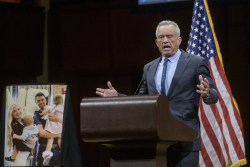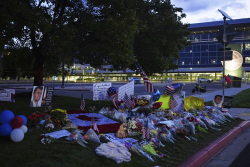
Charlie Kirk championed free speech as a fundamental American value. So, it’s sad—and ironic—that the murder of the 31-year-old conservative activist has triggered a fresh round of censorship, alarmingly aimed at teachers and other government employees. Educators in a dozen states have been fired or placed on leave for online statements that criticized Kirk or expressed approval of his death.
Education Week notes the breadth of the surveillance of educators: Teachers in “California, Florida, Iowa, Pennsylvania, Maryland, Massachusetts, Michigan, North Carolina, South Carolina, Oklahoma, Oregon, and Texas have been fired or placed on leave ahead of investigations into alleged social media comments critiquing Kirk and implying approval of Kirk’s death.” In Washington, D.C., at the State Department, Christopher Landau, the deputy secretary who essentially serves as the secretary’s number two official, wrote online that “I have been disgusted to see some on social media praising, rationalizing, or making light of the event, and have directed our consular officials to undertake appropriate action,” referring to Mr. Kirk’s killing. “Please feel free to bring such comments by foreigners to my attention so that the @StateDept can protect the American people.” And a Republican lawmaker in Colorado called on the state’s Democratic governor to dismiss a state employee who posted that Kirk was “a white man who spews horrid shit against every marginalized community.” John Phelan, the Navy secretary, posted a message saying that sailors or Marines found to be “displaying contempt toward a fellow American who was assassinated” would be “dealt with swiftly and decisively.”
I thought that’s what happens in authoritarian countries: government officials monitor public expression and penalize those who say the wrong thing. But it’s happening in the United States of America.
Let’s be clear: teachers have no right to propagandize in their classrooms about Charlie Kirk or anything else. But the ones who were fired or suspended last week commented on social media, imagining it was a forum for free and open dialogue. While there may be some extreme statements for which educators might be investigated, even in their social media postings, such as racist and pedophilic remarks, their comments about Kirk were political musings not germane to their teaching duties.
Republicans used to worry that technology companies censored speech via content moderation and other restrictions. Now they’re calling for restrictions to ensure nobody besmirches Kirk. One GOP representative said he planned to use “Congressional authority” to compel tech companies to ban any user who “belittled the assassination of Charlie Kirk.”
Many of these censors also praise Kirk as a tribune of free speech.
In many ways, he was. By his own estimate, Kirk spoke at 150 colleges and universities each year. He eagerly challenged left-leaning students via his signature tagline, “Prove Me Wrong.”
That rarely happened. Kirk was older and more eloquent than most of the students he took on. He was also a voracious reader, which helped him expose their ignorance and biases.
And he posted these exchanges on social media, drawing millions of viewers. In one video, a student claims that Kirk—who never graduated from college—lacks “qualifications” to speak about economics. “Who is Milton Friedman?” Kirk replies. Of course, the student doesn’t know.
In another video, a pregnant student considering abortion tells Kirk that having a baby would “ruin” her life. He counters that the baby is a “blessing” rather than an “annoyance.” On social media, Kirk affixed a pointed caption to the exchange: “Lol. She lost her point from the very beginning.”
That was the main point of Kirk’s project: to own the libs. He boasted that if you gave him 15 minutes with any college student, he could “deprogram years of indoctrination.” The goal wasn’t to foster debate, but to wean young people off liberal ideas.
But give Kirk credit: he showed up and said what he thought. That’s what he was doing at Utah Valley University last Wednesday, when he was assassinated while answering a question about, of all things, school shootings. His right-wing allies demanding restraints on speech are betraying his legacy.
They resemble Kirk’s antagonists on the campus left, who often tried to shut him down. Indeed, a few days before he was murdered, students at another Utah university circulated a petition demanding the cancellation of a scheduled appearance by him. “Hosting speakers who propagate divisive and contentious ideologies threatens the inclusive atmosphere that many have worked tirelessly to build,” declared the petition at Utah State University, where Kirk was slated to speak on September 30. “The broader community . . . deserves to experience an environment free from unnecessary provocations that could lead to discord.”
That’s the cry of the censor, always and in all places: we must prohibit provocative language because it can lead to discord.
Of course it can. But it’s the price of living in a democracy. We can’t engage in self-government without the freedom to deliberate on what divides us. Autocracies dictate what you can and can’t say. In democracies, it’s up to us.
I understand the impulse to penalize people who celebrated Kirk’s death or called him a Nazi. Their comments are crude, callous, and offensive, but such is life in a free society. Kirk said some pretty offensive things, too: Islam is “not compatible with Western civilization,” pandemic vaccine requirements are like South African apartheid, “prowling Blacks” threaten whites in American cities, and doctors providing gender-affirming care ought to face a “Nuremberg-style trial.”
Kirk also insisted on his right to speak freely, no matter who was offended. “You should be allowed to say outrageous things,” he told the Oxford Union earlier this year. In the end, he lost his life for that freedom. We compound the tragedy of his death if we turn our backs on what he believed.
The post Don’t Shut Down Free Speech in Charlie Kirk’s Name appeared first on Washington Monthly.


 3 hours ago
2
3 hours ago
2 










 Bengali (Bangladesh) ·
Bengali (Bangladesh) ·  English (United States) ·
English (United States) ·